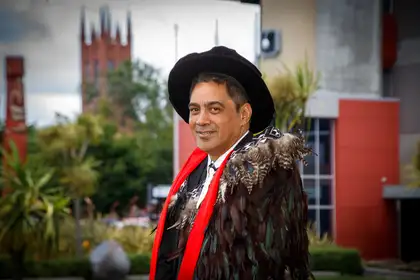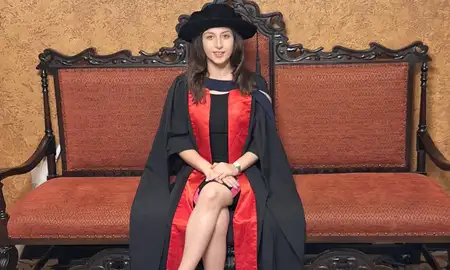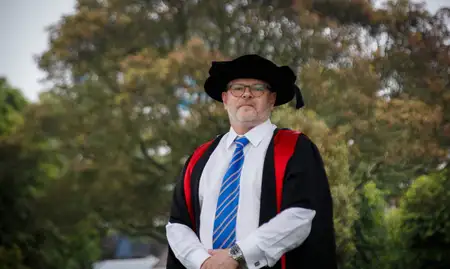
His doctoral research into Ngā Kōti Rangatahi o Aotearoa Marae-Based Youth Courts examines how this innovative judicial model promotes the wellbeing of Māori youth and their whānau.
Integration of Māori tikanga is prevalent in many facets of Dr Findlay’s life. Rooted in his upbringing and deep cultural heritage, Dr Findlay’s work was influenced by strong whānau values.
“Kia ora tātou, He uri tēnei o Te Aitanga a Hauiti, Ngāti Porou, Ngāpuhi me Ngāti Raukawa. Ko Edward Findlay tōku pāpā. Nō Kotirana ia. Ko Hinepō Henare tōku māmā. Ko Gwenda taku hoa rangatira. Ko Delys, rātou ko Scarlet, ko Eru ā māua tamariki. Ko Eru Findlay tōku ingoa. Nō reira, tēnā tātou katoa.
“My introduction embodies my ethnic identity and its importance and relevance to me. As a child I was brought up by grandparents whose first language was te reo Māori, and who practiced tikanga everywhere they went, and in everything they did. They were my first examples of kaupapa Māori approaches. If you entered their whare, you were treated as special guests.”
Dr Findlay’s research serves as a ten-year study into the effects and outcomes of Ngā Kōti Rangatahi. His master’s research found that Ngā Kōti Rangatahi did reduce offending through social and cultural engagement. Building on this, his PhD explored whether these programmes also improved the health and wellbeing of rangatahi and whānau, and how outcomes could be measured.
Dr Findlay applied findings from the 2003 paper by Ahorangi Taiea Distinguished Professor Graham Hingangaroa Smith, CNZM, FRSNZ, Ngāti Apa, Ngāti Kahungunu, Te Aitanga a Hauiti, Kāti Māmoe, titled Kaupapa Māori Theory: Theorising Indigenous Transformation of Education & Schooling, 2003.
“Kaupapa Māori approaches the theory that: 'to be Māori is the norm’. As an analytical approach, kaupapa Māori is about thinking critically, including developing a critique of Pākehā constructions and definitions of Māori and affirming the importance of Māori self-definitions and self-valuations [Smith, 2003]. With regard to Ngā Kōti Rangatahi, it is a response to the Westminster model courthouse-based forms of justice in the Aotearoa New Zealand context.”
Dr Findlay’s approach to his best practice framework was derived from the Te Whare Tapa Whā model, developed by Professor Emeritus Sir Mason Durie, ONZ, KNZM, Ngāti Kauwhata, Ngāti Raukawa Te Au ki te Tonga, in 1984.
“Māori practices refer to 'kawa' or the traditional Māori processes enacted at Ngā Kōti Rangatahi. Māori spirituality refers to the Māori spiritual processes, including karakia, acknowledgment of the deceased, and references to Māori Gods. Māori relations refers to the interaction between the Ngā Kōti Rangatahi professional, the youth, and the whānau.”
He emphasises the importance of cultural identity in addressing social problems like youth offending, drawing on previous research that links negative or absent cultural identity to higher rates of offending.
“Although there are incremental signs of successful kaupapa Māori approaches in justice reducing Māori criminal offending, for example the Iwi Justice Forums, there is still a way to go to reverse the statistics – statistics that have emerged over decades and may take the same amount of time to reverse. The big question that my thesis did answer was, is te reo Māori me ōna tikanga relevant to vulnerable rangatahi and their whānau, and can it be implemented and taught to them? And the answer is yes.”
Dr Findlay hopes other studies will explore how effective kaupapa Māori approaches are in justice and other fields, similar to the way his own research explored the topic.
“To me, Ngā Kōti Rangatahi, conveys that no matter who you are, and what you’ve done, you’re still part of a whānau, hapū and iwi, and as such, are always a part of the Māori collective. This perspective should also be conveyed in the broader justice system and the other fields of the Aotearoa New Zealand governmental service system.”
Dr Findlay is a Manaaki Navigator for Manaaki Tairāwhiti, supporting whānau to navigate local services in Te Tairāwhiti.
Related news
A journey through history: the academic path of a lifelong learner
Dr Delwyn Blondell's Massey journey began with a passion for history and evolved into a deep academic commitment.

The dark side of social media: Uncovering the cost of viral challenge trends
Dr Victoria Nazari’s PhD research examined how different groups perceive risky social media challenges and how these perceptions impact participants.

Investors leading property price escalation in Tāmaki Makaurau Auckland
In his doctoral thesis, Dr David White researched whether investors have been pushing up house prices in Tāmaki Makaurau Auckland.
